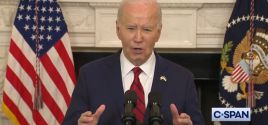How to Provoke a Crisisby Jacob G. HornbergerAug. 26, 2014 |
Popular 
Claim Jewish Student Was 'Stabbed In The Eye' by Pro-Palestine Protester Draws Mockery After Video Released

Senate Passes $95B Giveaway to Israel, Ukraine, and Taiwan, Combined With TikTok Ban

Biden Signs Bill to Give $95B to Israel, Ukraine and Taiwan, Ban TikTok

Mistrial Declared in Case of Arizona Rancher Accused of Killing Migrant Trespasser

'These Protesters Belong in Jail': Gov. Abbott Cheers Arrest of Pro-Palestine Protesters at UT Austin
 .jpg) There is no one more capable at provoking a crisis than the U.S. national-security establishment. They are absolute experts at doing so. They have to be. Their survival and ever-increasing tax-funded bounty depends on it. There is no one more capable at provoking a crisis than the U.S. national-security establishment. They are absolute experts at doing so. They have to be. Their survival and ever-increasing tax-funded bounty depends on it.Consider, for example, a recent altercation between a U.S. surveillance plane and a Chinese fighter jet near the coast of Japan. According to an article in the New York Times, U.S. officials filed a formal complaint with China accusing the Chinese fighter pilot of approaching so close to the American spy plane that their wingtips were only 30 feet apart. Then the pilot did a roll to expose the weaponry on his plane. The Chinese rejected the complaint and pointed out that the U.S. military's frequent surveillance flights near China were risking an accident. Notice something important about this particular crisis and, for that matter, virtually all of the U.S. foreign-policy crises: They almost always occur "over there" and hardly ever over here near the United States. That is, they involve U.S. military or CIA forces doing something provocative in or near foreign lands rather than foreign forces coming over here and doing something provocative in or near the United States. Of course, U.S. officials always play the innocent in these faraway crises. For example, in the latest crisis with China, U.S. officials would point out that their surveillance planes are operating in international waters, which, they would say, they have a right to do under international law. But that's not the point. The point is that no one likes to be spied on, especially by some foreign regime. Just ask all the people who have been spied upon by the NSA, including those in foreign governments that are considered allies of the United States. Imagine if China, Russia, Syria, Cuba, or Iran began flying surveillance planes along the east or west coasts of the United States, including taking pictures of U.S. military bases, planes, and weaponry. Wouldn't that provoke one great big crisis, one that might even involve a mobilization of troops and other preparations for war? Even if those countries responded that they were operating their spy planes in international waters, the response of U.S. military and CIA officials would be: "Get out of here immediately and go home." So, why would it surprise anyone that China would react the same way when it comes to American spy planes flying along China's coast? Actually, I doubt it surprises anyone, especially those within the U.S. national-security establishment. After all, don't forget that a Chinese fighter jet and a U.S. Navy spy plane collided near China in 2001, a collision that killed the Chinese pilot and caused the American plane to make a forced emergency landing on a Chinese island. So, why do it? Why fly spy planes near China when you know what the reaction is going to be? Because the U.S. national-security state needs crises -- perpetual crises, whether in Iraq, Afghanistan, Yemen, Syria, Ukraine, Korea, or other places faraway from American shores. Crises are the lifeblood of the national-security state. They help remind Americans that the Cold War-era national-security state apparatus that was grafted onto our governmental system is still necessary to America's survival as a nation. Without perpetual crises, Americans might start asking why they still need a national-security state apparatus, along with its power, influence, and ever-increasing tax-funded budgets. _ Jacob G. Hornberger is founder and president of The Future of Freedom Foundation. He was born and raised in Laredo, Texas, and received his B.A. in economics from Virginia Military Institute and his law degree from the University of Texas. He was a trial attorney for twelve years in Texas. He also was an adjunct professor at the University of Dallas, where he taught law and economics. In 1987, Mr. Hornberger left the practice of law to become director of programs at the Foundation for Economic Education. He has advanced freedom and free markets on talk-radio stations all across the country as well as on Fox News' Neil Cavuto and Greta van Susteren shows and he appeared as a regular commentator on Judge Andrew Napolitano's show Freedom Watch. View these interviews at LewRockwell.com and from Full Context. Send him email. |



